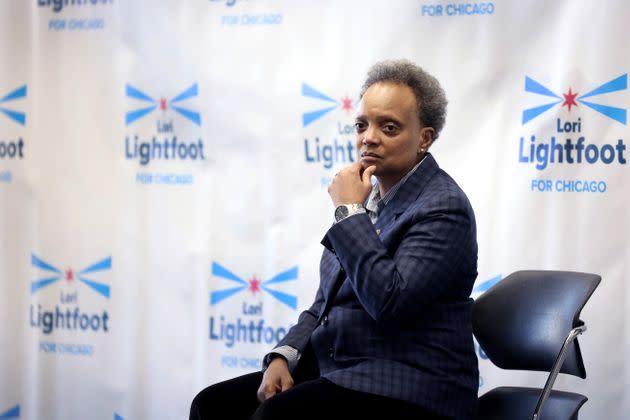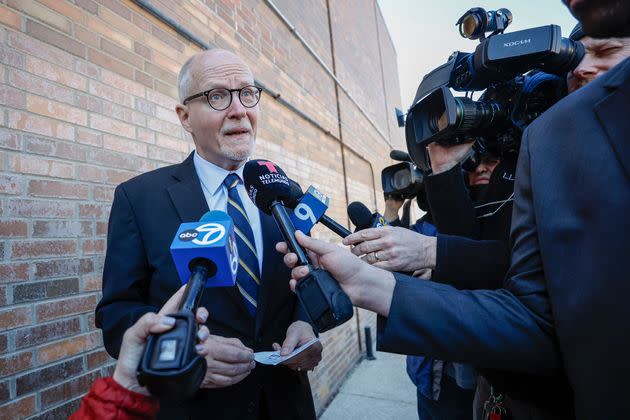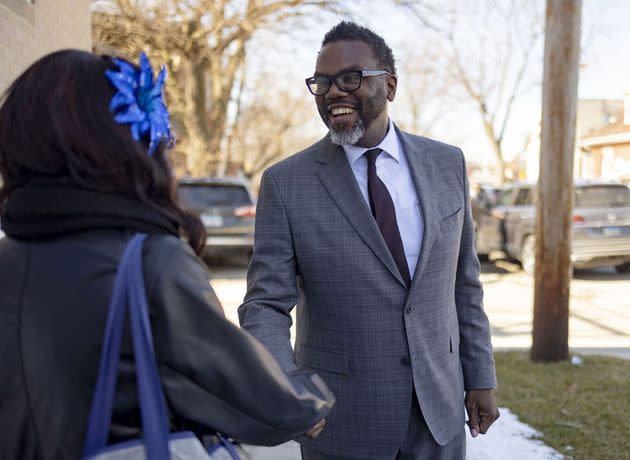Chicago Mayor Lori Lightfoot Falls Short In Bid For Second Term
- Oops!Something went wrong.Please try again later.
- Oops!Something went wrong.Please try again later.

Chicago Mayor Lori Lightfoot had asked voters for four more years to continue her work reducing crime and investing in underserved neighborhoods. They did not give it to her.
Chicago Mayor Lori Lightfoot lost her bid for a second term on Tuesday after failing to land one of the top two spots in the city’s nonpartisan mayoral race.
Since none of the nine mayoral candidates won an outright majority in the first round of voting, the two highest vote-getters will compete for control of City Hall in an April 4 runoff election.
Paul Vallas, the centrist, ex-CEO of Chicago Public Schools and the field’s only white candidate, came in first place with more than one-third of the vote as of late Tuesday evening.
Vallas will face Brandon Johnson, a progressive Cook County commissioner, who bested Lightfoot for second place.
Johnson’s strong showing sets up a stark ideological and policy choice for voters in the nation’s third-largest city. Rather than participate in a contest that is mostly a referendum on Lightfoot’s mayoralty, Chicagoans will get to decide between Vallas, a white, dyed-in-the-wool centrist, and Johnson, a Black progressive who would likely be the most left-wing mayor that the city has ever had.
Lightfoot’s defeat is a blow to supporters who celebrated her victory as the city’s first Black woman and openly gay person to serve as mayor.
The outcome also reflects the fierce challenges facing big-city mayors following the tumult of the COVID-19 pandemic, civil unrest after the May 2020 murder of George Floyd, and a concurrent increase in gun violence and other forms of crime.
Lightfoot sought, unsuccessfully, to persuade voters that the city had begun turning the corner under her leadership and that her ouster would set back progress in lifting up underprivileged neighborhoods.
“What we have done through the greatest challenges that this city has probably faced since the Great Fire [of 1871] is we have continued our march towards equity and inclusion and justice,” she declared at a Feb. 9 press conference with Black clergy supporting her reelection. “And we will not turn back. We will not give up. We will forge forward.”
Lightfoot is the first incumbent Chicago mayor to lose an election since 1989, when Eugene Sawyer, who was appointed after the sudden death of then-Mayor Harold Washington in 1987, lost his bid for a full term. Jane Byrne, Chicago’s first female mayor, was the city’s most recent elected mayor to lose her race when she failed to win a second term in 1983.
With the support of the Fraternal Order of Police, Chicago’s police union, Vallas presented the starkest alternative to Lightfoot’s leadership for voters concerned about crime and public safety.
He maintained that additional funding and a new mayor whom police officers trust could help “slow the exodus” of cops from the city and fill the Chicago Police Department’s 1,600-person backlog relative to its 2019 personnel levels.
“This election is about leadership, a crisis of leadership, because every single problem the city’s experiencing — from a degraded police department, deteriorating schools, or ever-increasing property taxes, fines and fees — is really a product of bad decisions from the fifth floor,” he said in a Feb. 9 candidate debate, referring to the floor of Chicago City Hall that the mayor occupies. “It didn’t begin with this mayor, but it certainly has gotten worse.”

Chicago mayoral candidate and former Chicago Public Schools CEO Paul Vallas speaks to the media after casting his ballot Tuesday.
Lightfoot also faced the public’s exhaustion with her penchant for personal squabbles that often dominated headlines. She was at odds with the city’s right-wing police union and also its progressive teachers union, a diverse array of City Council members, and even the owners of professional football’s Chicago Bears, who have threatened to leave the city.
Indeed, at times, Lightfoot seemed to be besieged by critics on her ideological left and ideological right without the relationships in the middle of the spectrum to anchor her.
“Where is her base anywhere in Chicago?” U.S. Rep. Jesús “Chuy” García (D-Ill.), one of Lightfoot’s challengers, asked HuffPost in a Feb. 9 interview. “It’s not in the Black community where you would think there would be a strong base. It’s not in the more progressive parts of Chicago today.”
Lightfoot’s reputation for acrimony, combined with the persistence of property crime in the city even after murders peaked in 2021, cost her the support of upper-middle-class white voters who had powered her first, reform-themed bid in 2019.
Linda Buckley, a retired businesswoman from River North, had supported Lightfoot in the first round of voting in 2019 but told HuffPost in mid-February that she was deciding between Vallas and García.
“I don’t think she works well with people,” Buckley said.
Lightfoot lamented the sexism and racism that she believes marked this kind of criticism of her governing style. And in the final weeks of her bid, she sought relentlessly to rally Black Chicagoans to her side, warning them of the consequences of losing one of their own at the helm.
Some residents heeded her call.
“She has been very clear of her intent to help build and help bring Black communities and those who are in need to the table, where her predecessors have boxed us out,” Rev. Cy Fields, pastor of a Baptist church on the West Side, said at the Feb. 9 press conference in support of Lightfoot’s reelection.
But her task was made harder by the presence of six other Black candidates on the ballot, including Johnson.
Johnson, a former schoolteacher and Chicago Teachers Union organizer backed generously by his union, joined other progressives in accusing Lightfoot of failing to deliver on promised changes to the city’s policing, mental health and public school systems.
“We’ve had mayors who have … capitulated over and over again to the ultra-rich, to billionaires, and to massive corporations,” Johnson told HuffPost in a mid-February interview. “And look how much despair it has caused!”
García, the left’s candidate against then-Mayor Rahm Emanuel in 2015, initially led Johnson in the polls.
But García got into the race in November, after much of the institutional left had begun coalescing behind Johnson. Progressive voters flocked to Johnson, who was running on a more ambitious, left-wing platform. And García actively alienated them with endorsements and other moves designed to mollify moderate voters.
“Chuy has been an important leader at the national level,” said Jane Jordan, a food policy advocate from Logan Square who was supporting Johnson. “He has failed to kind of articulate a comprehensive platform in the way that people like Brandon Johnson have.”

Brandon Johnson greets a voter after a church service on Sunday. His second-place finish sets up a stark ideological and policy battle with Vallas in the runoff.
Jordan had come to hear Johnson, Vallas and a handful of other candidates speak at a “food justice” mayoral forum at the University of Illinois Chicago on Feb. 10.
Johndrea Holt, a small-business owner from the West Side who was there, also said she was leaning toward voting for Johnson, who is raising his family in the troubled Austin neighborhood near where she lives.
“Johnson is very relatable because of my own personal experience ― some of the places he’s lived, some of the experiences he’s had,” Holt said.
Johnson ran on imposing a series of new taxes targeting the rich and corporations to generate $1 billion in new revenue while sparing homeowners a property tax hike.
Unlike his opponents, he insisted that it would be unrealistic to fill the Chicago Police Department’s 1,600-person backlog in the near term and instead proposed using efficiency savings to add 200 detectives through internal promotion. He would also use new funds to invest in improved mental health care, expanded youth summer job programs and non-police alternatives to violence prevention.
Seizing on Johnson’s sponsorship of a resolution in July 2020 calling for Cook County to “redirect” resources from law enforcement and incarceration to social programs, Lightfoot accused him of wanting to “defund the police.” She even featured Johnson’s comments on a radio show in which he appeared to embrace the slogan in a digital attack ad.
But Lightfoot’s efforts to reduce Johnson’s favorability, particularly with Black voters, likely came too late. She waited until the final two weeks of the race to attack Johnson in paid advertising after spending months trying to cut García down to size.
Although Johnson has promised not to reduce police funding as mayor, Vallas is likely to pick up where Lightfoot left off and depict him as a left-wing radical hostile to traditional policing and hellbent on soaking the city’s taxpayers.
Lightfoot did offer Johnson and his allies a road map for attacking Vallas in the runoff. In advertisements and on the stump, Lightfoot dubbed Vallas, a self-described “life-long Democrat,” a “Republican” whose efforts to appeal to conservative white voters’ fears of crime were the “ultimate dog-whistle.”
Vallas has some ammunition with which to push back on those claims. He told HuffPost that he only ever considered running for a county office as a Republican in 2009 so he would not have to contend with the grip of the Chicago machine.
But Vallas’ ties to right-wing groups like the Fraternal Order of Police have already proven to be a headache for him. In late February, he denounced the union’s decision to host Florida Gov. Ron DeSantis (R) for a speech to its members.
Vallas’ history as a champion of charter schools and foe of teachers unions is, on its own, likely enough to unite much of progressive Chicago against him.
“Vallas is bad for Chicago,” said Stephanie Gadlin, a former Chicago Teachers Union official who supported García.
Electing him, Gadlin added, “Would be the equivalent of hiring Count Dracula to run the blood bank.”
